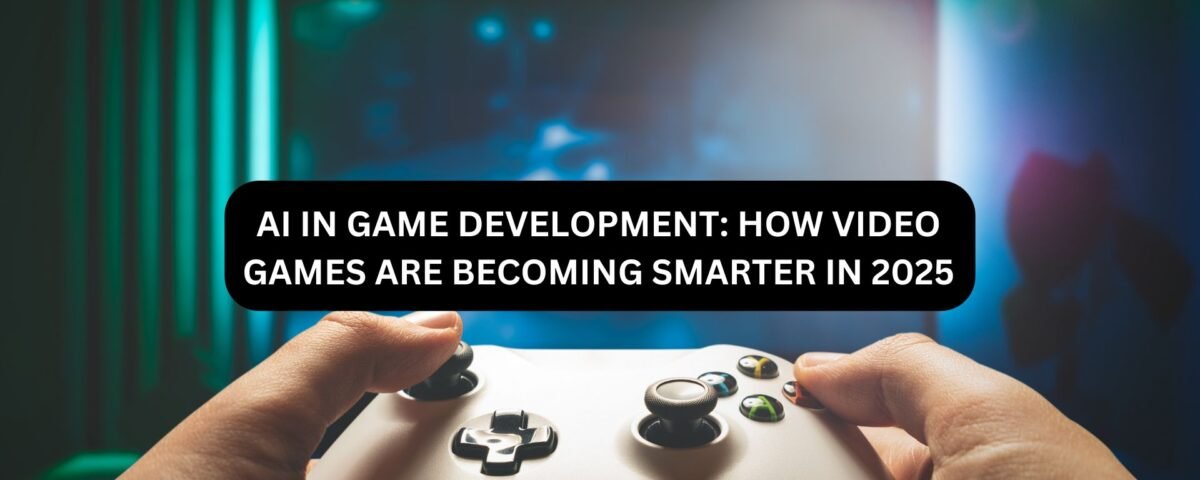
How Trump’s Tariffs Will Affect IT Rental Services in India
February 4, 2025
Apple M5 Chip Enters Mass Production for MacBook Pro, iPad Pro & Vision Pro
February 6, 2025Artificial Intelligence (AI) has been a cornerstone of game development for decades, shaping everything from enemy behavior to procedural world generation. However, in 2025, AI is revolutionizing gaming like never before, making virtual worlds more immersive, intelligent, and adaptive. With advancements in machine learning, natural language processing (NLP), and neural networks, modern AI-driven games are providing players with experiences that were once thought to be science fiction.
This article explores how AI is making video games smarter, covering areas such as procedural content generation, NPC intelligence, personalized gaming experiences, AI-assisted game design, and the future of AI in the gaming industry.
AI-Powered Procedural Content Generation
One of the most exciting applications of AI in game development is procedural content generation (PCG). AI algorithms can generate vast, unique, and dynamic game worlds, reducing the need for manual content creation.
1. Endless and Unique Game Worlds
Games like Minecraft, No Man’s Sky, and The Elder Scrolls have demonstrated how procedural content can enhance replayability. In 2025, AI-driven PCG is more advanced, allowing developers to create expansive, ever-changing worlds filled with diverse landscapes, quests, and characters. Machine learning models analyze player behavior and preferences to generate content tailored to individual playstyles.
2. AI-Generated Storylines and Dialogues
Thanks to advances in natural language processing (NLP), AI can now craft compelling and adaptive storylines. Instead of pre-written narratives, AI-driven games generate dynamic quests and dialogues that change based on player choices. This ensures a more immersive and personalized experience, making every playthrough feel unique.
Smarter NPCs with Advanced AI
Non-playable characters (NPCs) have come a long way from their static, predictable behaviors. AI is now making them more intelligent, realistic, and engaging.
3. Realistic Enemy Behavior and Adaptability
AI-powered enemies no longer follow predictable attack patterns. In games like The Last of Us Part II and Halo Infinite, enemies adapt to player tactics, use cover effectively, and communicate with each other. In 2025, AI-driven NPCs exhibit human-like intelligence, making combat encounters more challenging and immersive.
4. Emotionally Responsive NPCs
Advanced sentiment analysis and deep learning models enable NPCs to respond to players in more human-like ways. If a player frequently acts aggressively, NPCs may become fearful or hostile. Conversely, acts of kindness may foster friendships or alliances. This creates a world where player actions have meaningful consequences.
5. AI-Driven Companion Characters
Companion AI has seen significant improvements, with AI characters behaving more like real partners rather than scripted followers. Games now feature AI companions that provide tactical support, learn from player strategies, and evolve based on interactions, enhancing the narrative and gameplay depth.
Personalized Gaming Experiences with AI
AI is making gaming experiences more tailored and dynamic by analyzing player preferences and adjusting game elements accordingly.
6. Adaptive Difficulty Systems
Gone are the days of static difficulty settings. AI-driven difficulty adjustment ensures that games remain challenging but fair. If a player struggles with a particular boss, the AI can subtly tweak the enemy’s behavior or provide hints. Conversely, if a player breezes through levels, the game may introduce tougher enemies or new mechanics to maintain engagement.
7. Player-Centric Content Customization
AI algorithms analyze playstyles and preferences to create personalized experiences. For instance, AI can recommend weapons, suggest quest paths, or alter in-game events based on player history. This level of customization ensures that no two players experience the game in the same way.
AI-Assisted Game Development
AI is not just enhancing gameplay—it is also revolutionizing the way games are designed and developed.
8. AI-Generated Assets and Animations
Game developers are leveraging AI to create high-quality assets, animations, and character models. AI-driven tools like NVIDIA’s GAN-based models and procedural texturing software streamline the development process, reducing time and costs.
9. Automated Bug Detection and Game Testing
AI-driven testing tools are now capable of identifying bugs, glitches, and balance issues faster than human testers. By simulating thousands of gameplay scenarios, AI ensures a polished final product while freeing developers to focus on creativity and innovation.
10. Voice Synthesis and AI-Driven Voice Acting
Text-to-speech AI is now capable of creating realistic voiceovers, reducing the need for extensive voice acting sessions. AI can generate dynamic voice lines on the fly, enhancing immersion by allowing NPCs to respond uniquely to player actions.
The Future of AI in Gaming
11. AI-Generated Games
While AI-assisted development is already here, the future could see fully AI-generated games. AI could craft entire game worlds, storylines, and mechanics without human intervention, potentially leading to an era of never-ending, self-evolving games.
12. AI and VR/AR Integration
AI is set to play a crucial role in shaping the future of virtual reality (VR) and augmented reality (AR). Smarter AI-driven NPCs, dynamic environments, and adaptive storytelling will make VR worlds feel more lifelike and responsive.
13. Ethical and Creative Considerations
As AI takes on a bigger role in game development, ethical concerns arise. Developers must ensure that AI-generated content respects diversity, avoids bias, and enhances creativity rather than replacing human ingenuity.
AI is fundamentally changing video games, making them more immersive, intelligent, and personalized than ever before. With smarter NPCs, procedural content generation, adaptive difficulty, and AI-assisted game design, the gaming industry in 2025 is witnessing an unprecedented transformation. As AI technology continues to evolve, the future of gaming looks more exciting, dynamic, and limitless than ever.
Whether you’re a game developer or a passionate gamer, one thing is clear—AI is not just making games smarter; it is redefining the way we experience digital worlds.






















